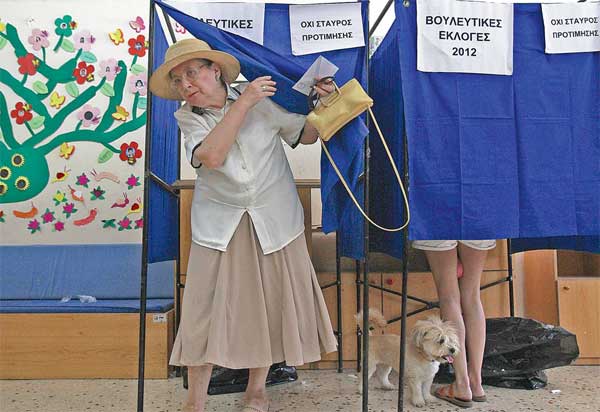Greek election too close to call
Updated: 2012-06-18 01:03
By Fu Jing in Athens,Chen Jia and Cheng Guangjin in Beijing (China Daily)
|
||||||||

Tight race means no single party likely to form government
Exit polls issued immediately after voting ended in the Greek general election indicated that New Democracy, a pro-bailout party, was marginally ahead of anti-bailout party, Syriza.
The main contenders, the right-wing New Democracy and left-wing Syriza, are at odds over whether broadly to stick with the tough EU bailout deal, or reject it and boost social spending.
The polls showed New Democracy taking between 27.5 percent to 30.5 percent of the vote, while Syriza was just behind with 27-30 percent.
The election result could decide whether Greece remains in the eurozone or decides to leave the currency.
The European Union and International Monetary Fund have insisted that the conditions of the €130 billion ($164 billion) bailout accord agreed in March must be accepted fully by a new government or funds will be cut off, driving Greece into bankruptcy.
All parties say they will keep Greece in the single currency, but Syriza leader Alexis Tsipras believes the agreement can be renegotiated without Greece having to leave, betting that European leaders cannot afford the turmoil that would be unleashed by cutting a member of the eurozone loose.
The leaders of the G20, gathering in Mexico, will be monitoring the result very closely.
Both German and French leaders and Brussels have vowed to keep Greece in the eurozone though sources from Brussels have told the media that it is designing countermeasures for a possible Greece exit.
Observers say the situation in Europe will not be stabilized until European leaders gather for an important summit on June 28-29 in Brussels to officially unveil the European Stability Mechanism. More initiatives on growth and jobs are also in the pipeline.
Lack of optimism
The election, the second in six weeks, was held just hours after the national football team secured their place in the knockout stages of the European Championship with a 1-0 win over Russia. The victory provided some measure of respite from the bad economic news.
"Winning the football match is more important than voting and I hope we can beat our next opponent, Germany," a taxi driver, who declined to be named, said.
Nearly 10 million out of 11 million Greeks were eligible to vote. The taxi driver said he would go to the polling station after work at about 5 pm, two hours before polls close. "But I will close my eyes and just choose one of the ballots randomly," the driver said. "I look at it as a game."
Many of the polling stations are located in schools.
At 10 am on Sunday, Manolis Mavrommatis, a candidate for the New Democracy Party, went to a school located in a well-off area in Athens. After his identity was checked, he was given twenty ballot papers, each representing a party. He marked and placed his chosen paper in an envelope in the voting booth and then emerged to place the envelope in the ballot box.
To no one's great surprise, Mavrommatis, 69, said he voted for New Democracy.
"The situation is at a very critical point. I believe that the new government will be a left-wing coalition of three parties. It will be led by New Democracy together with Pasok and Dimar Kouvelis," Mavrommatis said.
He said his party leader, Antonis Samaras, sent a letter to EU leaders saying New Democracy will recognize austerity measures demanded by the EU before bailout money was delivered.
"But negotiations are needed on certain terms," he said. "Europe is our hope."
Mavrommatis insisted that there will be no more cuts in salaries or pensions and tax will also be reduced.
Ardreas Mouzakis, 56, a shop owner, said he voted "for a party which has never been in government''.
"I think politicians today should be responsible for the disaster which the country is going through. They have destroyed our country. And I want a new, clean, government to secure the country's future," Mouzakis said after voting in a school in central Athens.
Mouzakis said that he has no problem with Europe because the problem is inside Greece, not outside. "Therefore, we should seek a solution from inside. The potential is there. We have strength in tourism and in the shipping industry," he said. "It is the failure of the traditional ruling parties that has driven the country to misery."

 Relief reaches isolated village
Relief reaches isolated village
 Rainfall poses new threats to quake-hit region
Rainfall poses new threats to quake-hit region
 Funerals begin for Boston bombing victims
Funerals begin for Boston bombing victims
 Quake takeaway from China's Air Force
Quake takeaway from China's Air Force
 Obama celebrates young inventors at science fair
Obama celebrates young inventors at science fair
 Earth Day marked around the world
Earth Day marked around the world
 Volunteer team helping students find sense of normalcy
Volunteer team helping students find sense of normalcy
 Ethnic groups quick to join rescue efforts
Ethnic groups quick to join rescue efforts
Most Viewed
Editor's Picks

|

|

|

|

|

|
Today's Top News
Health new priority for quake zone
Xi meets US top military officer
Japan's boats driven out of Diaoyu
China mulls online shopping legislation
Bird flu death toll rises to 22
Putin appoints new ambassador to China
Japanese ships blocked from Diaoyu Islands
Inspired by Guan, more Chinese pick up golf
US Weekly

|

|






